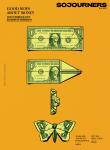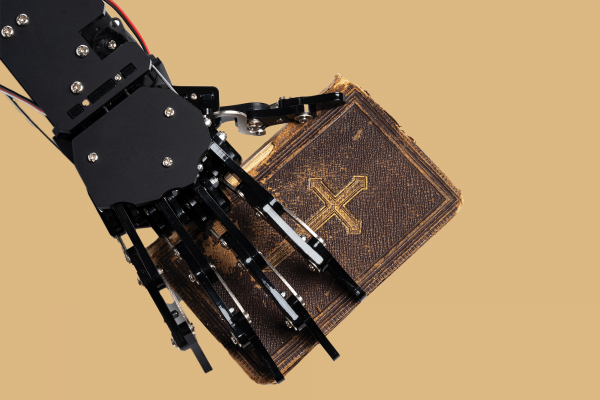AMONG TECHNOLOGICAL INNOVATIONS today, perhaps none is imbued with more hope—or more hype—than artificial intelligence (AI). Its proponents, such as billionaire technologist Marc Andreessen, claim it will literally “save” the world. Critics (see Kate Crawford’s Atlas of AI ) claim it is, in many ways, built on misunderstanding, exploitation, and deceit. But nearly everyone agrees that AI is a powerful tool that presents us with profound, and profoundly moral, challenges.
While Christianity offers a wealth of wisdom concerning moral and ethical behavior, materialist perspectives (a philosophy in which all facts are reducible to physical processes), which function as “articles of faith” in modern technical circles, have become the acceptable rhetorical scaffolding for “ethical” AI. For many, materialist perspectives deny the existence of God and any idea of eternal consequences but seek to compel people—and their technologies—to behave ethically, nonetheless.
While a strongly worded what is a good start, only a robust why can compel humans to want to be good, and only a robust how can enable them to do so. This is where materialism begins to falter, and Christianity can enter the debate with authority. The Christian faith acknowledges God as the originator, motivator, and sustainer of righteousness, asserting that moral behavior is the fruit, not the root, of a righteous life. It challenges us to look beyond a humanistic idea of ethics and toward a creative and abundant notion of goodness that cannot be accomplished by our own will or power. As AI has grown increasingly powerful and we have seen a proliferation of applications, particularly with large language models achieving nearly “human-level” performance, some tech leaders, perhaps sensing the difficulty of controlling their own creations, have called for “a pause on giant AI experiments.” Academic literature is rife with serious concerns on racism in AI development, theft of creative content, development of autonomous weapons, and more. At least one tech leader, Microsoft’s Brad Smith, perhaps mindful that AI ethics is too heavy a lift for technologists alone, has invited religious voices into the conversation.
This seems to be an inflection point, then, for Christians to speak up. We might begin with the premise—amply supported in scripture—that since ethical ideals, even if codified into regulations and laws, have not been enough to ensure ethical humans since the Fall, they will not be enough to ensure ethical AI either. What’s more, when the purview of AI ethics research points solely to anthropological remedies, it disenfranchises theological remedies which, Christians will argue, are foundational to the others.
Theology, once regarded as the “queen of sciences” or the doorway to scientific discovery, has been relegated to “minor royal” status in academic circles. But from a modern Christian perspective, theology is the lens through which all other sciences make sense. As C.S. Lewis wrote, “I believe in Christianity as I believe that the sun has risen, not only because I see it but because by it, I see everything else.”
AI is, at its core, a prediction engine, meant to help us sort through the noise of data and arrive at the signal of decision. Even generative models are only predicting the next word or thought or image. Most AI models in use today are to help people make “data-driven” decisions. The Generative Pre-trained Transformer (GPT) models have brought a new ethical concern into the conversation, but we’re still looking for a shortcut to wisdom. And if, according to Proverbs, “by wisdom, God created the world,” then we’re also looking for a shortcut to creativity (another form of wisdom).
If the ultimate purpose (or telos) of modern AI is wisdom (the ability to make good and just decisions), then the Bible reveals its source. “If any of you is lacking in wisdom, ask God, who gives to all generously and ungrudgingly, and it will be given you” (James 1:5). The Christian worldview holds that humans, through Christ, already have both the divine mandate and divine power to make wise decisions: “Those who are spiritual discern all things, and they are themselves subject to no one else’s scrutiny. ‘For who has known the mind of the Lord so as to instruct him?’ But we have the mind of Christ” (1 Corinthians 2:15-16). Crowd-sourced AI wisdom does not reflect divine wisdom but rather reflects a situationally positioned, mathematically averaged version of human intelligence that gives equal weight to the wise and the foolish and ignores the absolute and transcendent. Therefore, while we can use AI to help us sort data and calculate probabilities, we should never delegate decision making to algorithms that power everything from smart homes to lethal autonomous weapons systems.
In a secularized, AI-centric world, deplatforming Christian perspectives may seem safe, but is it wise? Is there evidence that humanistic efforts alone result in safe, ethical AI, free from the injustices that result from the age-old human pursuit of privilege, power, and profit? Or might we be ignoring, even suppressing, evidence that points in another direction? Christian texts, teachings, and traditions suggest the latter.
The Christian ethical framework presents a more inspirational and sustainable vision than its secular counterparts because it backs up the what of ethics with the why of Jesus and how of the Holy Spirit. Christ exhorts us to “seek first the kingdom of God and God’s righteousness” (Matthew 6:33) because we can trust God to take care of us in all other ways. The Christian contribution to AI ethics could be revolutionary, challenging us to look beyond a minimum-standard culture of ethics toward a robust culture of righteous AI. Certainly, ethics and regulatory laws are necessary for the governance of civil society, but they have never proved historically or biblically sufficient to vanquish the reality of evil and the effects of human sin that find their ways into our lives and our technologies. Only Jesus can do that. Only Jesus has done that.

Got something to say about what you're reading? We value your feedback!







